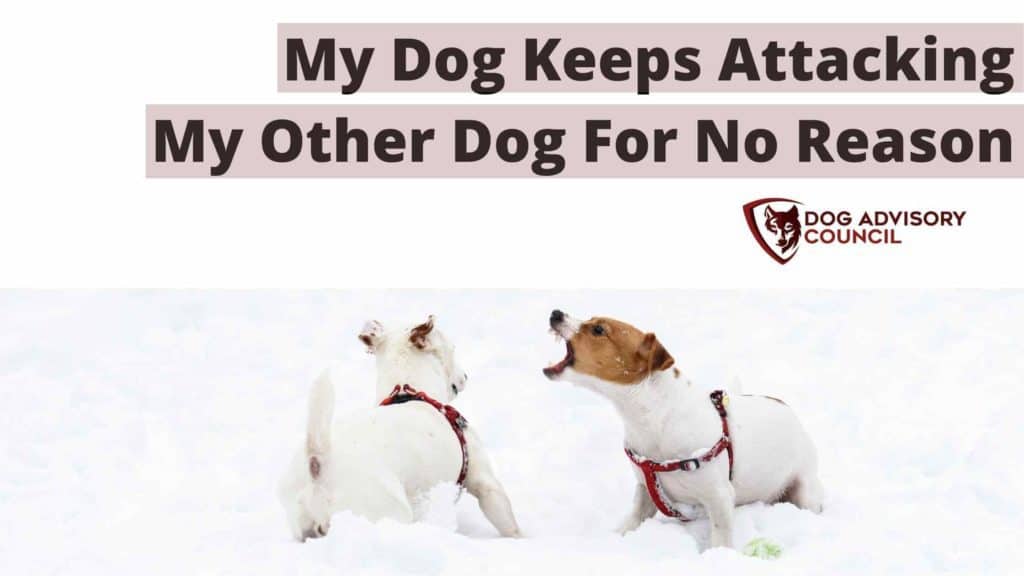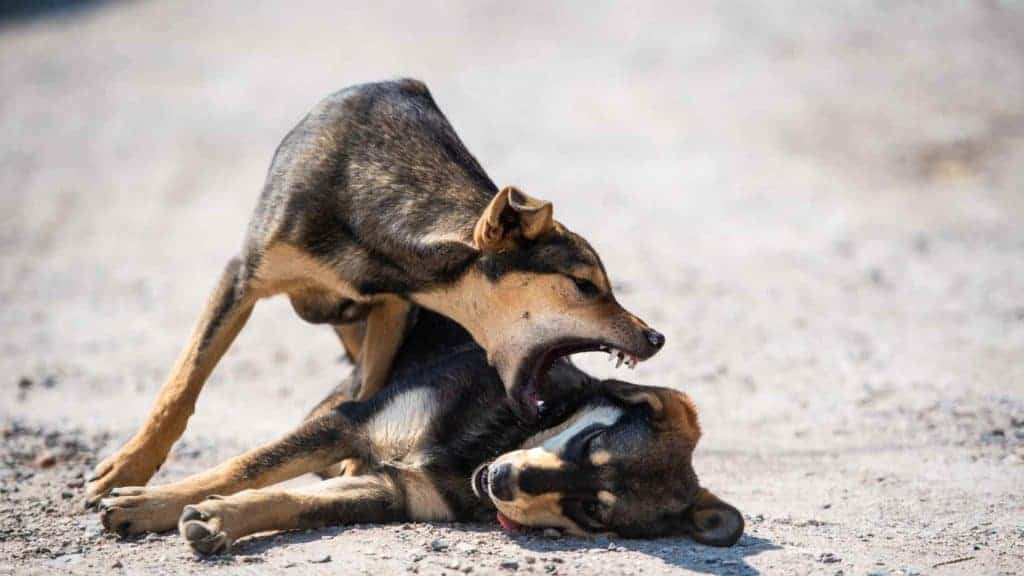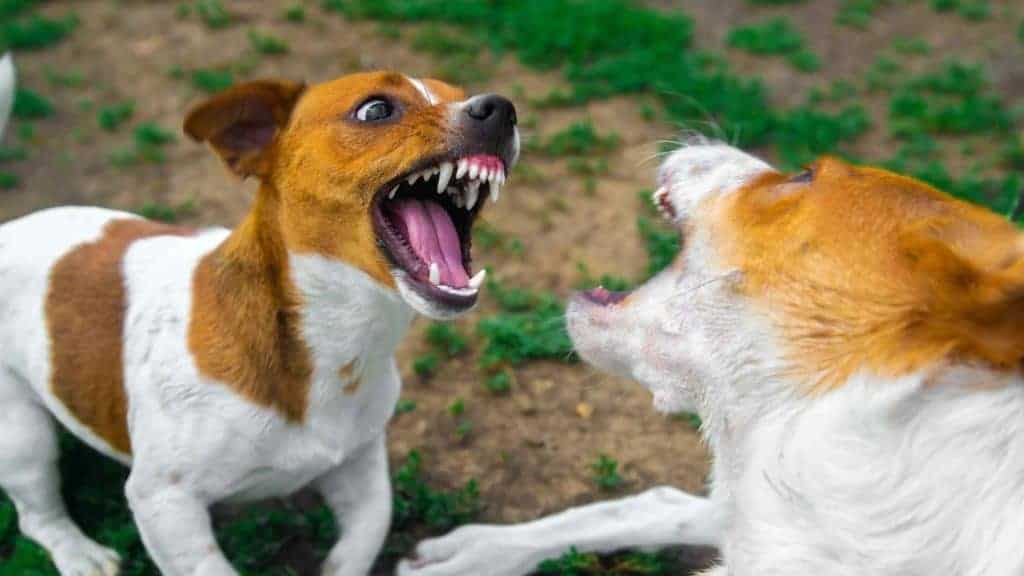
Are you frustrated and worried because your dog keeps on attacking another household dog for no apparent reason?
Here’s what you need to know about why and how to address the problem so that you can fix it.
If your dog is attacking another dog in your house, it could be because the aggressive dog is fighting for dominance.
The aggressive dog tells the other household dog that they are in charge and get dibs on food, favorite toys, and attention from the humans.
Sometimes this will come on seemingly from “out of nowhere” when it’s more of a “last straw” situation.
If the attacks are especially sudden and out of character, the aggressive behavior can signify that the aggressive dog is sick or injured, feeling frustrated, stressed, scared, or even overexcited.
Read more on how to interpret each of these below.
Are dog attacks serious?
If you’re looking at this because your dog has had a skirmish with a sibling, you might be tempted to play it down as just disagreement.
In some cases, this is undoubtedly the case. After all, even the best of friends will have moments when tension arises.
However, snapping and growling can quickly escalate to the point of attacks, leading to injury or worse (more on that later).
Whenever one dog in your household attacks another, it should always be taken seriously so that you can keep everyone safe and sound.
Unlimited claims, No credit checks, No upper age limit & Multiple pet discounts
Compare the best rates on pet insurance
Common reasons for “unprovoked” dog-on-dog attacks
To our eyes, dog attacks come out of nowhere and are unprovoked by the innocent second dog.
However, our human eyes often miss the warning signs clearly and waiting for us if we know where to look for them!
Dogs communicate with each other through snapping, baring their teeth, tail position and movements, and raising the fur on their backs.
While we can catch those signals if we are watching for them, they tend to get lost in the hubbub of everyday life. Some of them may happen while we humans aren’t around to supervise, either.
Essentially, one household dog attacking another one isn’t unprovoked. There are always warning signs that we either catch or miss.
Why is my dog attacking my other dog?
If your dogs were previously besties and found snuggling together on multiple occasions, you may be completely confused about why one is suddenly attacking the other.
The most common reasons, as introduced above, include:
- Dominance/resource guarding
- Last straw
- Sickness or injury
- Frustration or stress
- Fear
- Overexcitement
Dominance/resource guarding
Many disagree on whether this is a learned behavior or a lizard brain (i.e., instinctive) behavior.
Regardless, it presents the same way! Your dog will see the other household dog as a threat to his resources. These include food, water, treats, toys, comfort, and love.
Whether this new dog is, in fact, new to the household or has been around for a while, the to-be-attack dog will see this newcomer threat that must be warned.
One of the most common terms for this is going to be a fight for dominance. Since dogs are pack animals, they will look for the alpha or try to be the alpha.
A dog who is resource guarding will be fighting for dominance over this other dog, shown through aggressive behavior that will convince the other dog to submit.
Last straw
This is similar to what we’ve talked about before but is vital to understand separately.
A dog may attack a dog that has been in the household for days, weeks or months, simply because that dog threw down “the last straw.”
From the would-be-attack dog’s point of view, it looks a little something like this: “I’ve been patient with you, but you just took my favorite toy, so I need to remind you who’s in charge and put you in your place!”.
As mentioned above, there would have been warnings that the new dog didn’t see or chose to ignore. The would-be-attack dog is now following through on those warnings to put the other dog in its “rightful” place.
Sickness or injury
If a dog is sick or injured (mild or severe), it won’t be as patient as usual.
If another dog starts picking or does something to make the other dog feel worse or in pain, the unwell dog will attack.
Think of this as a “Back off, I don’t feel good. Leave me alone.” This is especially so if the other dog wants to snuggle or play.
Frustration or stress
A dog who is frustrated or stressed is going to have minimal patience.
So, when another dog takes his favorite place to sleep, the dog will be so angry that he’ll tell the other dog off so that he can rest in peace.
Again, this will also happen if the dog wants to play and snuggle when the other dog wants to be left alone.
Fear
Dogs feel fear a lot more than most humans realize, brought on by something like fireworks, a new person, a new animal, being disciplined severely by a family member, etc.
In struggling to deal with that fear and confusion, this dog won’t want to be pestered or generally around another dog. It may even be that they blame that other dog for the fear, even if that dog is entirely innocent.
Similarly, if that other dog is looking for comfort because it is feeling scared, the other dog won’t have it since it is also dealing with the fear and trying to understand what’s going on.
Overexcitement
This one is often confusing until you think about communication between dogs and what it may mean.
When a dog is excited about a new person arriving, a tasty treat, going for a walk, or something else like that, they’ll get so excited that they’ll just need to take that out on the other dog, and they will actually attack them. In this case, it’s a happy motivation rather than a negative one.
This is similar to how, for example, kids get so over-excited that they’ll start hitting or even crying and having a tantrum. They’re so overwhelmed with excitement, and they just have to let it out somehow.

Should I intervene when my dogs fight?
A great question. If it’s a serious fight (and not play fighting), you’ll want to intervene if you can do so safely.
Make sure that you are firm when intervening, but resist the temptation to be angry or chastise either dog. This can just make the problem worse and build up resentment between the dogs.
If the fight continues or goes on despite your intervention, you’ll want to put each dog in separate rooms until either, or both, calm down.
If separation isn’t possible, you’ll need to muzzle both of them to prevent either of them from getting hurt.
Will dogs stop fighting on their own?
If you’re feeling frustrated because your dogs are fighting and you’re concerned that it will not stop, it’s okay to be feeling this way. After all, you love your dogs, and you don’t want either of them to be hurt or scared!
Dogs will stop fighting when the issue for the fight itself is revealed and resolved. After all, the war itself is the symptom of something else going on with the dog attacking the other one.
The critical point is, of course, resolving the issue! This is not a situation where you can just ignore it and hope for the best.
This could end up with one dog hurt and terrified, and it may get to the point where having a healthy relationship between both dogs is impossible.
How do I stop my dog from attacking my other dog?
First and foremost, you’ll want to focus on following the proper steps to help keep the aftermath as safe as possible. The steps to follow for everyone’s safety and peace of mind are:
- Separate dogs temporarily
- Resolve the issue
- Monitor together time
- Keep it a positive experience
- Repeat as necessary
Separate dogs temporarily
This is done just to make sure that everyone takes a few minutes to cool down and remember that they love each other, basically.
Humans do this all the time, after all! The separation should be done not as a punishment but just to prevent someone from getting hurt.
Take some time to cool down yourself, too. Dogs feed off our energies, after all. If we are calm and collected, this can help re-introduce and deal with the problem much easier.
Resolve the issue
Next is going to be figuring out what problem caused the fighting in the first place. This can be challenging, but it’s essential for prioritizing.
Dominance/resource guarding /last straw
If your dog is attacking your other dog because of any of these three issues, you’ll be happy to know that it’s relatively easy to solve.
You simply need to help your new dog understand where the rules are and help your other dog understand that its needs aren’t going to be threatened.
Teaching the new dog about boundaries would make sure each dog gets their favorite toy and that the new dog isn’t’ taking over all of the best snoozing spots.
If there are particular spots that your other dog loves, you’ll want to make sure that it still gets access to those spots. After all, the new dog probably won’t care, anyway!
When it comes to helping your current dog make the adjustment, it’ll be more about reminding it that it is still loved and wanted. After all, there’s so much jealousy that goes on at first when a new pet comes in.
Remind your current dog that you still love them, and there are still lots of treats and toys and walks to be had. Spend dedicated time one-on-one with your dog so that they can understand that they aren’t simply being replaced. Tugs on the heartstrings, doesn’t it?
Sickness or injury
If you think that your dog may be sick or injured, even if it’s not especially obvious to you, a trip to the vet is a great idea.
This is also great if you notice other signs of a problem, including lack of appetite or being very sensitive with one paw.
Frustration/stress/fear
If your dog is frustrated, stressed, or fearful, the main focus is going to be making sure that they know everything is okay. This will be mainly through your attitude and energy.
In the case of frustration, take a look at what is making your dog frustrated. Is the newer dog doing something? Is your dog frustrated because there has been no designated walk for a day or two?
When it comes to stress, this could be stress from something like hearing the word “v-e-t” or having a stressful new person or animal come into the house, etc.
As much as possible, do what you can to limit stress and be a calming influence so that they know everything is okay.
With fear, this is where you can be your fearful dog’s very best friend. A calm and loving tone is one of the best things to focus on when talking to and dealing with your fearful dog.
Stay calm, give him lots of snuggles, and make it clear that he is safe and sound. Do this with both dogs, if necessary, but remember to give both equal attention.
Overexcitement
If your dog is overexcited, you’ll want to do what you can to limit unbridled excitement in your dog. For instance, teaching them to control themselves and “calm down” when things get exciting.
For example, if your dog gets over-excited when walking, keep your dogs on separate leashes with a bit of distance to prevent snapping and nipping. Or let them loose outside so that everyone has space to be excited without injury.
Monitor together time
When you have the issue resolved and sorted out as best as possible, you’ll want to monitor their time together after a fight/attack. Keep an eye on both dogs for signs of another one, and make sure that they both firmly listen to you when you need them to.
Keep it a positive experience
Even in a situation where things get testy or perhaps your dogs “still aren’t talking to each other,” make sure that you keep yourself positive and calm.
It will help them settle down and get things back to normal much easier and faster when they see that you are feeling positive, too.
Repeat as necessary
If they get into another fight, repeat these steps. Keep on doing it for as long as it takes to help restore the peace in your house.
If you feel that you aren’t getting to the bottom of the issue or that the re-introduction process isn’t quite going well, consider hiring a dog behavior specialist to help! It could be a simple fix that will really make the difference.

Will neutering my dogs stop them from fighting?
Neutering your dog is an excellent idea for many health reasons. It can have a significant effect on limiting aggression, too.
Since their testosterone levels will drop, this will also lower aggression naturally in them. This is mainly going to be helpful if they are fighting for dominance with another male or trying to be alpha over your female dog.
Can dogs live together after fighting?
Absolutely! Like any siblings, there will be fights, and it can be terrifying for us humans. However, you need to have a plan in place to make sure that they are correctly re-introduced and that they can get along.
If you do separate them, make sure that they aren’t separated too long. This can lead to resentment between them, and it may even make the situation worse!
How do I know if my dogs like each other?
Signs of there being dislike between your dogs (either way or just one way) include some of the following behaviors:
- Growling and snarling
- Lack of attention to the other dog
- Leaving the room when the other dog enters
- Rushing between humans and other dogs when they start to interact
What do you do when two dogs don’t get along?
Firstly, try all of the tips above. Dogs can get jealous of other dogs, which is especially common when bringing a new dog into a household.
Over time, and with lots of patience and reassurance, dogs will often get alone. Or, at least tolerate each other.
If that doesn’t seem to be happening in your case, you’ll have to consider keeping them separate from each other when you are away from home and tolerating the fact that you’ll never find them snuggled up together.
My dog killed my other dog. What should I do?
This is every pet parent’s worst nightmare, but the sad reality is that it does happen.
Most of the time, well-intentioned dog owners overlook their dogs’ aggressive personalities. Or they put them together to “work it out.” This can lead to escalating attacks and death.
In this situation, it’s crucial to never, ever blame the dog. The dog is simply acting to defend itself from a threat or acting out because it doesn’t know the difference.
In both cases, the owner would be the responsible one. It isn’t fair, perhaps, but it is the truth. Dogs act how they are taught.
It’s easy to simply want to euthanize the dog because they “shouldn’t be alive,” but this is never the answer. Neither is surrendering the dog to the shelter.
Both just blame and punish the dog for something that it was doing because it either had to defend itself or didn’t realize it was doing anything wrong.
The dog shouldn’t be allowed near other dogs at all, or not without a muzzle and a firm leash. You must make sure that it doesn’t have another opportunity to potentially do harm.
Meanwhile, you’ll need to bring in a qualified behaviorist to help you assess the reason behind the behavior. This will help you train your dog correctly so that you can make sure that nothing like this ever happens again.
All in all
Dogs attack each other for reasons including alpha behavior, annoyance, injury, and fear. Understanding the cause will help you to correct the behavior to help everyone get along and stay safe.
A dog randomly attacking another household dog could be fighting for dominance, resource guarding, injury or illness, feeling frustrated, stressed, or scared.
Dog attacks should always be taken seriously by addressing the root of the problem and fixing it properly so that both dogs stay safe!
Unlimited claims, No credit checks, No upper age limit & Multiple pet discounts
